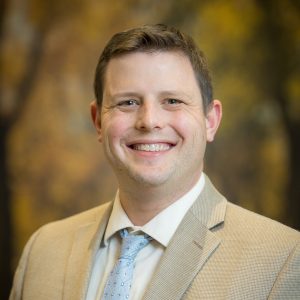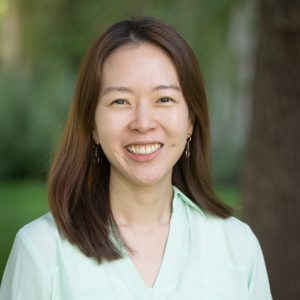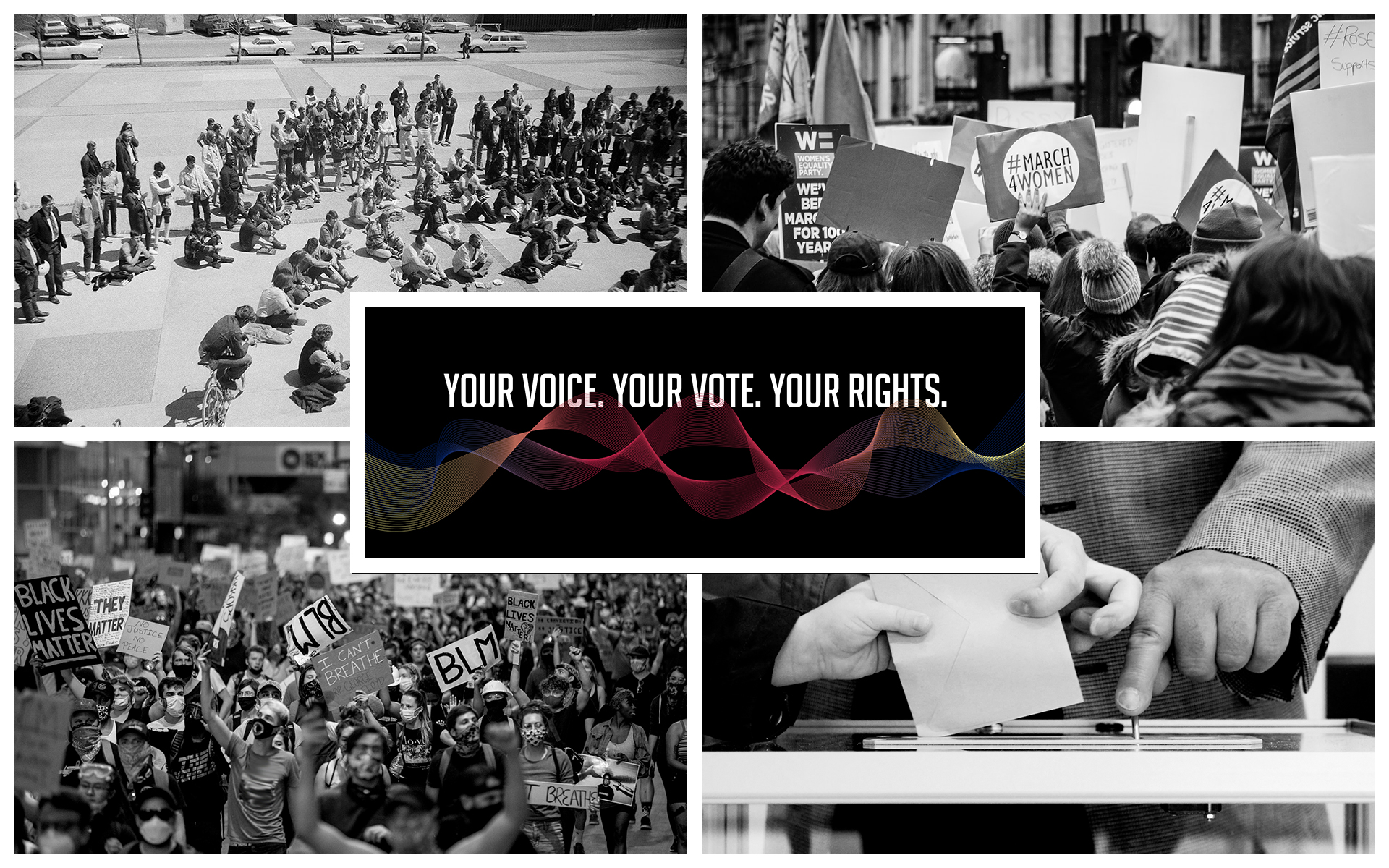Emerging from another polarizing and contentious election season, Americans might be asking themselves, “how healthy is our system of government?” Political polarization is high, trust in the government is low, and there seems to be little agreement on issues affecting the nation.
Are America’s politics sick beyond repair? Is mistrust a chronic condition that will never heal? Or is democracy doing okay?

What is a healthy democracy?
David McIvor, CSU political science professor, says that asking the question, “how healthy is democracy,” reveals certain assumptions and metaphors by which we understand democracy and its proper functioning or dysfunction. He says that we tend to see democracy in terms of a system of governance, and we see functioning in terms of each part (elected officials; voters; the separate branches of government, etc.) fulfilling its role.
However, this is only one way, and a fairly limited way of looking at democracy. The word democracy itself comes to us from the Greek words demos, meaning “people,” and kratos, which is often translated as “rule” but is better translated as “power,” or “the capacity to act; to begin something; to initiate.” Democracy, then, is an orientation to life in which power is widely dispersed, shared, and suffused into the everyday life of the people.
In this respect, “democracy might better be understood as a standard for health, as opposed to something that can be healthy,” McIvor said. Democracy could be understood less in terms of a functioning system, like the operation of a clock, and more in terms of an endless process, like the movement of the planets.
McIvor points out that in a democracy, all people, ideally, participate in power rather than just a single individual or a small group of people, as it is in authoritarian societies. “Democracy, then, rests on a principle of inclusion. ‘The people’ includes everyone,” McIvor said, “although every ‘people’ we have known has been characterized by exclusions.”
Democracy has always been “two-faced” insofar as it aspires towards inclusion while its history has been marked by exclusions—both violent, such as slavery, or more subtle, such as felon disenfranchisement.
Democracy Defined
The word democracy itself comes to us from the Greek words demos, meaning “people,” and kratos, which is often translated as “rule” but is better translated as “power,” or “the capacity to act; to begin something; to initiate.”
Democracy could be understood less in terms of a functioning system, like the operation of a clock, and more in terms of an endless process, like the movement of the planets.



Defining democracy through elections and voting
“The most basic, minimalist definition of ‘democracy’ is that of a system in which losers of elections accept defeat and concede power,” said Dominik Stecuła, CSU political science assistant professor. “If one of the two major parties that we have refuses to do it, then we’re in trouble.”
Stecuła is concerned that messages from political elites might erode trust in the electoral process itself. And others share Stecuła’s concerns.
Bright Line Watch is a team of political scientists from universities across the country who conduct ongoing surveys of scholars and the public regarding the health of America’s democracy. Their website states, “One of the greatest threats to democracy is the idea that it is unassailable.”
Matthew P. Hitt, CSU associate professor of political science, regularly participates in these surveys. Hitt assesses whether certain standards in a society are essential for democracy or not, and whether the United States currently meets these standards.
One standard, among the 30 that experts respond to, is: “elections are conducted, ballots counted, and winners determined without pervasive fraud or manipulation.”
Hitt says that this standard is essential for a healthy democracy, and according to him, the United States currently meets this standard with few exceptions.
But democracy requires more than fair electoral competition and peaceful transfers of power. Some argue that democracy requires that all adult citizens enjoy the equal opportunity to vote, another standard in the Bright Line Watch surveys.


Equal Justice for All
If a democracy requires that all citizens receive equal treatment and justice under the law, is the United States living up to that standard when it barrs certain people from participating?
Courtenay Daum, CSU political science professor, devotes much of her research energy to this very question.
Her recent book, The Politics of Right Sex: Transgressive Bodies, Governmentality, and the Limits of Trans Rights, looks at how difficult it can be for transgender people to advance their claims for equal rights and treatment under the law.
According to Daum, while mobilizing for change through the legal system might have worked well in the case of marriage equality for white, cisgender, gay and lesbian citizens, the concerns of trans people of color are not well served by investing so many resources in such a fight.
Daum argues that trans people of color and others with intersectionally oppressed backgrounds do not necessarily benefit from strategies that require expensive court cases.
“…looking to the courts as the defenders of the marginalized in a democratic system omits the responsibility that we the people have for working to change and dismantle systems of oppression and to challenge systemic racism, patriarchy, and heteronormativity in our own lives and communities,” Daum said.
Other concerns, such as disproportionate negative attention from law enforcement, may get ignored when the fight for LGBTQIA+ justice remains focused on legal rights acquired through the judicial system.

The Power of Democracy Worldwide
If we think of democracy as a standard to be lived up to, what benefits might society expect as its citizens engage in a more inclusive democratic process? To answer that question, scholars often cast a global net, as the struggle for equal justice goes far beyond the United States. Julia Lee, CSU political science assistant professor, studies the impact of improving women’s representation in government on the vital, real-world experiences of people in developing countries.
Access to basic sanitation facilities, such as clean and safe toilets, remains an issue that impacts quality of life for billions of people, particularly women in the developing world. Not only do unsatisfactory or non-existent facilities cause health problems, but they also leave women vulnerable to violence.
The democratic process can help with difficult problems like this one. Lee’s research in India demonstrates that when more women enter leadership positions in local government, access to clean and safe sanitation facilities rises.
“Having more women in leadership positions helps address the burdens of poor sanitation that disproportionately affect women,” said Lee. When more kinds of people participate in governing, direct societal benefits can indeed add up as a result of a more inclusive democracy.

The Hard Work of Democracy
Hitt notes that for most of human history, people lived under systems of government that were anything but democratic. After the collapse of the Greek and Roman republics in the ancient world, it wasn’t until the American Revolution that representative democracy returned.
“Living in a democracy requires real work and difficult compromises from every citizen,” said Hitt. “Ultimately, it’s up to every generation of Americans to actively decide that our democratic principles are worth defending and supporting, even when elections or policies don’t always go the way we might want.”
Colorado State University showed its commitment to strengthening democracy in several ways during the 2020 election.
At the system level, CSU’s “Your Voice. Your Vote. Your Rights.” initiative emphasized, “voting in local and national elections is an important right guaranteed to citizens and is an excellent way for college students to amplify their voices,” and provided helpful information about voting in Colorado.
“Living in a democracy requires real work and difficult compromises from every citizen. Ultimately, it’s up to every generation of Americans to actively decide that our democratic principles are worth defending and supporting, even when elections or policies don’t always go the way we might want.”
The initiative also sponsored a series of panel discussions and disseminated information regularly to the university community throughout the fall 2020 semester. Topics included free speech, student activism, and academic freedom. Members of the campus community can take advantage of resources such as tips on fostering civil discourse in the college classroom, as well as instructor and student guides to academic freedom on campus and in class.
Additionally, the initiative invited CSU graduates working in journalism and other frontline political careers to discuss the real-world ways in which our alumni work towards civic engagement and strengthening democracy in a panel entitled, “CSU Grads on the Political Front Line.”
Democracy is complicated and difficult, with no one way to determine its “health.” But it’s also vital for human flourishing, even when there are serious signs of “illness” in our system of government. Colorado State University, true to its land-grant mission, researches these vital issues on campus, and extends out into the community to offer expertise and guidance to provide citizens the knowledge and action they need to keep our democracy functioning, and maybe even make it stronger.
